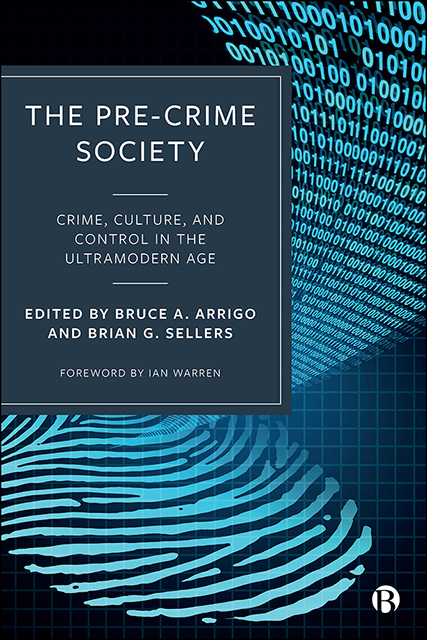Book contents
- Frontmatter
- Dedication
- Contents
- Notes on Contributors
- Foreword
- Introduction: The Ultramodern Age of Criminology, Control Societies and ‘Dividual’ Justice Policy
- Part I Theories, Theorists and Theoretical Perspectives
- Part II Institutions, Organizations and the Surveillance Industrial Complex
- Part III Dataveillance, Governance and Policing Control Societies
- Part IV Systems of Surveillance, Discipline and the New Penology
- Part V Globalizing Surveillance, Human Rights and (In)Security
- Afterword: ‘Pre-Crime’ Technologies and the Myth of Race Neutrality
- Index
18 - Big Data, Cyber Security and Liberty
Published online by Cambridge University Press: 14 April 2023
- Frontmatter
- Dedication
- Contents
- Notes on Contributors
- Foreword
- Introduction: The Ultramodern Age of Criminology, Control Societies and ‘Dividual’ Justice Policy
- Part I Theories, Theorists and Theoretical Perspectives
- Part II Institutions, Organizations and the Surveillance Industrial Complex
- Part III Dataveillance, Governance and Policing Control Societies
- Part IV Systems of Surveillance, Discipline and the New Penology
- Part V Globalizing Surveillance, Human Rights and (In)Security
- Afterword: ‘Pre-Crime’ Technologies and the Myth of Race Neutrality
- Index
Summary
Introduction
The growth of digital technology has created opportunities for individuals to interact and share information in real-time using any combination of text, image and video (Wall, 2001; Newman & Clarke, 2003; Holt & Bossler, 2016; Lee & Holt, 2020). There are now vast quantities of data generated from humans’ use of various technologies, providing both industry personnel and academic researchers with an alternative way to examine social phenomena (Silverman, 2013; Holt, 2017). In fact, there is now distinct terminology used to reference such data, commonly called ‘big data’, which is generally defined as voluminous datasets that cannot be ‘perceived, acquired, managed, and processed by traditional information technology and software/hardware tools within a tolerable time’ (Chen et al, 2014, p. 173). Big data is increasingly used by interested stakeholders to illustrate trends and patterns that confirm and/or challenge wider assumptions (Laney, 2001; Khoury & Ioannidis, 2014; Wu, Zhu, Wu & Ding, 2014; Liu, Li, Li & Wu, 2016; Williams et al, 2017; Song, Song & Lee, 2018; Lee & Holt, 2020).
Researchers across numerous disciplines examine big data sets to address various topics (see Sensmeier, 2015; Lee & Holt, 2020). Nursing scholars, for example, use big data to improve patientclinician communications, as well as improve their awareness of emerging health issues within the wider population (Sensmeier, 2015). Real-time access to patient information provides nurses with the ability to make optimal clinical decisions regardless of care setting, satisfying an integral part of the profession (Sensmeier, 2015). Similarly, criminologists and other social scientists use big data to assess offenders’ motivations, methods and target preferences on various computer-mediated communications (CMC) platforms (D’Ovidio et al, 2009; Maimon et al, 2014; Song et al, 2018). Exploring these sources provide deeper insights at the individual and aggregate level to understand both offender perspectives and potential targets for victimization (Lee & Holt, 2020). In essence, big data allows interested stakeholders to make data-driven predictions and better-informed decisions that can result in more favorable outcomes and effective strategies (McAfee & Brynjolfsson, 2012).
While analyses of big data have the ability to reveal various trends and patterns that can be explored to support and/or challenge wider assumptions, the data on its own does not enable researchers to make any inferences (Smith, Bennett Moses & Chan, 2017; Song, Song & Lee, 2018; Lee & Holt, 2020).
- Type
- Chapter
- Information
- The Pre-Crime SocietyCrime, Culture and Control in the Ultramodern Age, pp. 409 - 432Publisher: Bristol University PressPrint publication year: 2021



